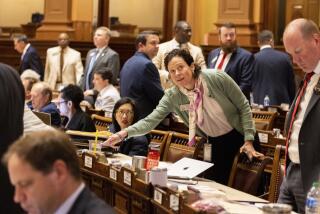Lawmakers on Common Ground With Election Reform Legislation
- Share via
WASHINGTON — Congressional negotiators agreed Friday on legislation to give states more than $3.8 billion and impose new national voting standards to help fix flaws exposed by the 2000 presidential election fiasco.
Breaking a lengthy partisan impasse, the compromise struck by House and Senate negotiators is meant to bolster voter access to the polls, minimize spoiled ballots and deter fraud. Lawmakers hope the bill, which President Bush has indicated he will sign, will restore confidence in an electoral process shaken badly two years ago.
The legislation takes special aim at two oft-ridiculed voting systems, setting aside $325 million to pay for replacing punch-card and lever-operated machines. Punch cards and the “chads” they produce--hanging, dimpled and otherwise--became infamous during the protracted Florida recount that ultimately determined the 2000 presidential race’s outcome.
But upgrading voting machinery is only one goal of the legislation. Just as important, lawmakers said, are provisions that seek to ensure equal access to voting through uniform nationwide standards.
Never before, lawmakers said, has the federal government injected itself so extensively into the details of how states run elections. Some lawmakers compared the measure’s potential impact to the 1965 Voting Rights Act, which ended discriminatory voting laws.
“With this bill, we move closer to the day when every vote cast will be counted,” said Sen. Christopher J. Dodd (D-Conn.), a lead negotiator on the compromise.
Rep. Robert W. Ney (R-Ohio), another negotiator, said the bill would “go on for decades to produce elections that leave no one behind.”
The compromise, melding bills passed in the House and Senate, is expected to come to a final vote before Congress adjourns shortly before the November elections.
While there were no figures immediately available on how much each state would get, California stands to receive hundreds of millions of dollars because much of the money would be distributed according to a formula tied to population.
Most of the bill’s key requirements would be enforced starting in 2004, though states would be able to obtain two-year extensions in some cases.
The measure’s enactment would represent the second major step by Congress this year to change the political process, following passage this year of the campaign finance law that aims to lessen the flow of large contributions to the two major political parties.
Because the voting bill deals directly with the issues most sensitive to a democracy and to partisan politics--who votes and how votes are counted--compromise was delayed for months as Republicans and Democrats bickered over fine points.
But lawmakers were given another reason to cut a deal last month when the Florida Democratic gubernatorial primary was clouded by widespread voting problems.
One key Republican, Rep. Roy Blunt of Missouri, also pointed to the brewing ballot controversy in this fall’s New Jersey Senate race as a reason to pass voting reform.
“There’s a lot of cynicism about elections in America right now,” Blunt said.
While Friday’s agreement drew applause across the ideological spectrum in Congress, some groups that have tracked the voting bill gave it mixed reviews.
The League of Women Voters expressed support with portions of the bill that would require and pay for better voting machines, voter education, training for poll workers and other steps to improve the voting process. But Kay J. Maxwell, the league’s president, said she was “deeply concerned about possible disenfranchisement of voters” through the bill’s anti-fraud provisions.
Those provisions were the main reason that prominent Republicans, such as House Speaker J. Dennis Hastert of Illinois and Sen. Mitch McConnell of Kentucky, embraced the legislation.
Throughout debate on the bill, Republicans generally focused on combating voter fraud while Democrats pressed to expand voter participation. In the compromise, each party claimed advances, following the formula coined by Sen. Christopher S. Bond (R-Mo.): “Make it easier to vote and tougher to cheat.”
To help prevent fraud, the bill would require all states to maintain statewide voter registration lists. It would also require new voters who register by mail to provide proof of identity when registering or when casting a ballot for the first time. Acceptable proof would include a utility bill, government check, bank statement or driver’s license.
Lawmakers stressed, though, that a photo identification was not required.
They also gave two options for voters who fail to carry acceptable identification.
States could electronically verify identity using a driver’s license number, the last four digits of a Social Security number or another assigned number kept in a database. And voters who still lack verification could cast a provisional ballot that would later be double-checked for validity.
In another anti-fraud step, the bill would require states to keep separate ballots cast after a polling station was scheduled to close.
Those ballots would be counted after state authorities upheld their validity.
This provision addresses complaints from Missouri Republicans about local officials keeping polling places open late in heavily Democratic areas of St. Louis in the 2000 election.
Democrats praising the bill included Rep. John Conyers Jr. of Michigan, a prominent member of the Congressional Black Caucus, who said he was “euphoric” about provisions he believes will expand voter participation.
Among them: States would be required to offer voters a chance to fix mistakes on ballots, set aside at least one voting machine in each precinct to allow disabled voters to cast private ballots, meet minimum voting error standards set by the federal government and define what constitutes a legal vote.
The last issue was a major dispute in the Florida recount in 2000.
Democrats also hailed the requirement for states to offer voters provisional ballots even if their names are not on a precinct list, to safeguard against inadvertent omissions or overzealous “purging” of voter rolls. While California already offers such ballots, many states do not.
(BEGIN TEXT OF INFOBOX / INFOGRAPHIC)
Key Ingredients of the Measure
Key provisions of the compromise reached Friday on legislation to reform voting procedures. Republicans pressed for anti-fraud provisions, while Democrats focused on increasing participation. It requires:
* First-time voters who register by mail to show proof of identity. Acceptable proof would include certain official documents with an address, a driver’s license or an identifying number, such as four digits in a Social Security number, kept in a state database.
* States to offer voters a chance to fix mistakes on a marked ballot
* Expanded disability access.
* States to give provisional ballots to those who lack proper identification or whose names are omitted from voter rolls.
Such ballots would be verified later.
More to Read
Get the L.A. Times Politics newsletter
Deeply reported insights into legislation, politics and policy from Sacramento, Washington and beyond. In your inbox twice per week.
You may occasionally receive promotional content from the Los Angeles Times.










